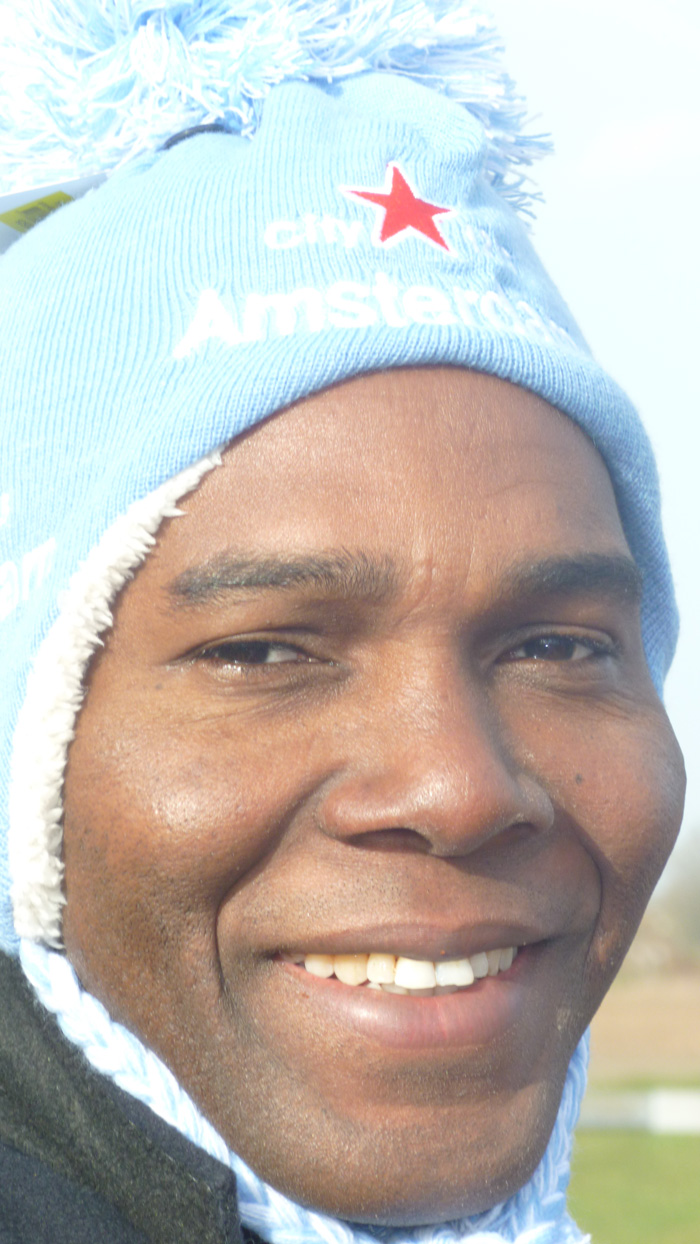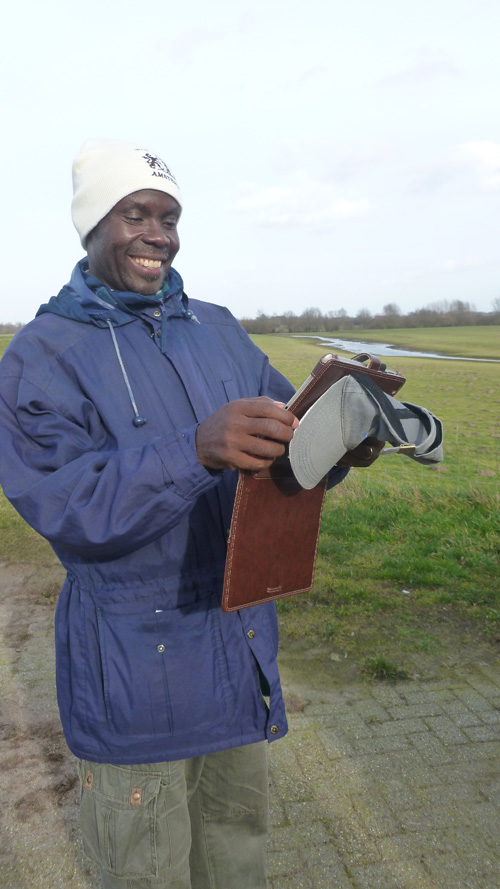Africa on the Dutch IJssel River
“I will not go!” Sena Alouka yells in the bus along the highway as we pass a desolate farm that is totally surrounded by bulldozers and soil that has been turned and ploughed. A familiar sight for most of the riders in the bus, which includes nine Africans, an Indonesian and a handful of Dutch people. Evictions and land expropriations are an almost daily occurrence in Africa and Indonesia. And then the whole group spontaneously chants: “I will not go! We will support you!”
Room for the River
It is 6 February and we are on our way to Voorst where we are going to take a look at the “Room for the River” project near the IJssel River. Sena Alouka, director of the environmental organisation JVE Togo, like the rest of the group, works on sustainable water management and the fair distribution of water in his own country. The group’s members work together with communities that all have vivid experiences of losing their livelihood when they’re suddenly faced with the fact that there are no more fish left in the river; or when the river just totally vanishes, leaving nothing to fish in; or when they discover their land and homes under water. Flooding sometimes also occurs in the Netherlands and so we are also going to see how this issue is tackled here.
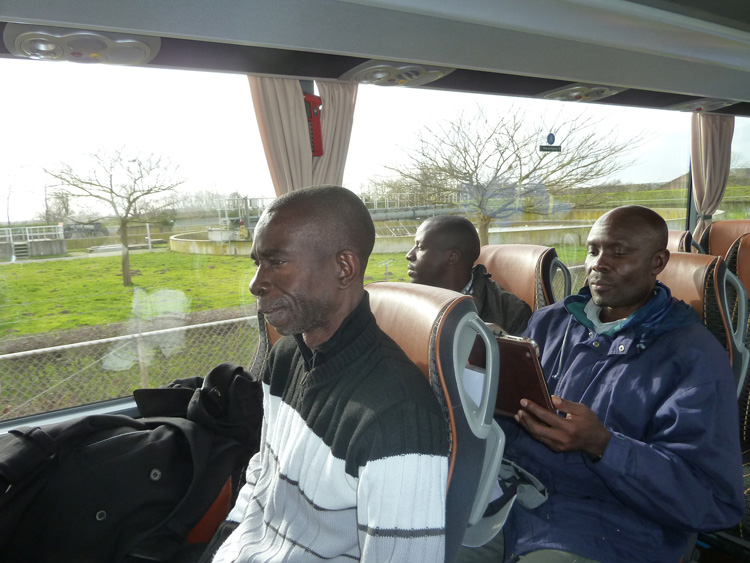
Mame Latyr Fall (Forum Civil Senegal) , Dickens Kamugisha (AFIEGO Uganda), Robert Kugonza (NAPE Uganda)
Contributing to the thinking process
The involved partners all know from years of experience how difficult it is to manage water supplies and rivers in a sustainable manner and how important it is to get all of various water users (those from the neighbourhood, farmers, businesses) involved. Plans drawn up and subsequently adopted by the authorities without local consultation are pretty much doomed to fail. It is only when ideas involve the input of everyone involved and their ideas are taken seriously that one and all will sufficiently feel responsible for the success of a particular project. The magic words in this case are “participatory water management”. But our partners want to take this further: not only do the participants involved have to approve the plans but they also need to work together during the development phases.
Top-Sector Water
This method, which is called the “Negotiated Approach”, has already produced some positive results in various river basin areas around the world. Both ENDS, together with the above-mentioned African and Indonesian partner organisations, have been very active in introducing this method into practice in the regions these organisations focus on. This, however, will only succeed if local and national governments support it, and the Netherlands can potentially play an important role in this regard. The Netherlands has designated water as one of its top sectors for serious involvement. We Dutch people know better than anyone about the need to harness water and this knowledge is something we are more than willing to export.
|
|
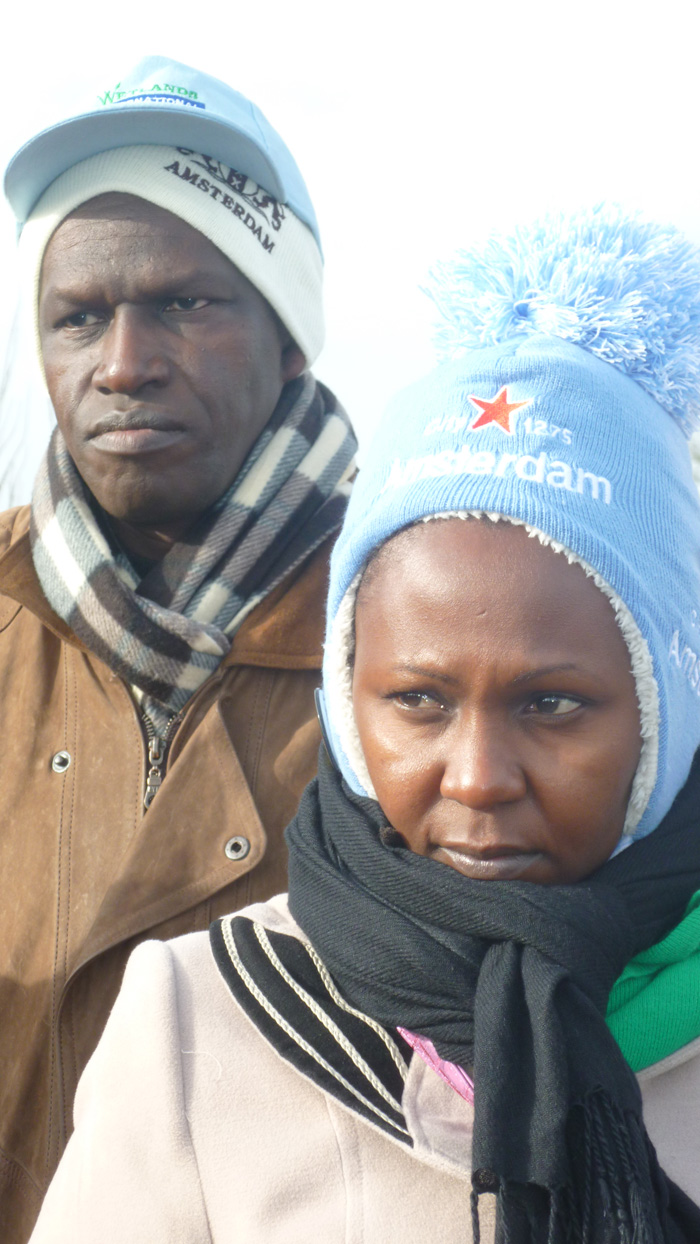 |
|
||
| Sena Alouka (JVE Togo) | Serah Munguti (Nature Kenya) and Papa Wawade Wade (Wetlands International Senegal) | Robert Kugonza (NAPE Uganda) |
However, we should not limit it to our technical knowledge; we should also be willing to export our water management “software”, which includes our experience with the consulting and negotiation processes, as well as our “polder model”. When it comes to water management, “software” is just as important as “hardware”. This became very clear during a recent luncheon reading organised by Both Ends on 5 February 2014 at the Ministry of Foreign Affairs, where two of our partners gave a presentation. By discussing their practical experiences in both Kenya and Togo, they were able to present a very powerful message.
Back to Voorst
Once we had arrived at the Water Board in Voorst we quickly saw with our own eyes the problematic nature of water along the IJssel. It is also became instantly clear how totally different the Dutch and African realities actually are. “How many homes end up under water here?” Serah Munguti of the Nature Kenya organisation asks the spokesperson giving us the tour of the project.
“For this particular part of the project we will need to evacuate about eight families.” Our guests stare at him in amazement. In other words, all this effort for just eight families? In Africa or Asia, a similar situation quickly means hundreds of victims. Moreover, the devastation these people experience largely goes uncompensated or under-compensated at best.
“And how much compensation do these families receive?” Munguti inquires.
“Enough to purchase a new farm, move all their belongings and start from scratch again.”
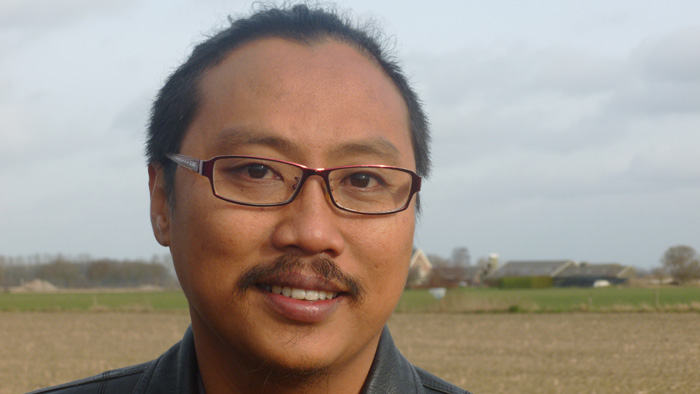
Prigi Arisandi (Ecoton Indonesia)
Prigi Arisandi, from Ecoton, an Indonesian organisation, is also very impressed. “We are already happy when the local government, after years of resistance and protest, finally relents and accepts responsibility for the quality of the water in our river. The issue of preventing flooding in Indonesia in the future has thus far remained unaddressed.”
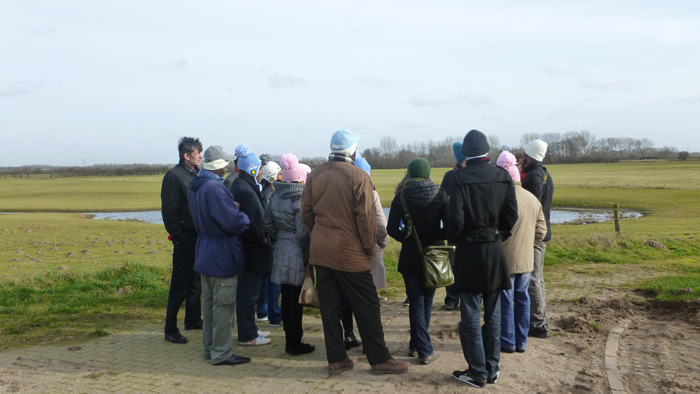
Readiness does not cost anything
It is obvious that the Dutch model can never be transferred directly on a one-to-one basis in Africa, Asia or Latin America. In the Netherlands, they make plans for the very long term and plans are only developed after extensive studies have been performed. Meanwhile, non-Western countries tend to more readily operate in an ad hoc manner. That is not something one can change in a day. But negotiating, listening to people with practical experience, understanding one another’s point of view, considering the various interests and collectively arriving at a compromise, are certainly details that fit into many other realities than just our Dutch context. This means, first and foremost, that consciousness-raising, support and preparation are of particular importance. This is something our guests hope to take back with them from the Netherlands.
More information:
Cases and experiences of our African partners
Video about the Negotiated Approach in India and Africa
Read more about this subject
-
 Instalink / 21 November 2024
Instalink / 21 November 2024 -
 Blog / 19 November 2024
Blog / 19 November 2024Building Monitoring, Evaluation and Learning systems based on mutual accountability and trust
Just before summer, on June 27th we participated in a panel discussion on inclusive conservation in a learning event organized by WWF Netherlands. Several organizations joined in a discussion on inclusive, decolonial, rights-based, and community-led approaches in conservation. We discussed the barriers, gaps and opportunities in how power is shared, inclusion promoted, and accountability practiced in our work. The question raised was: as Dutch-based organizations, are we doing enough to really work inclusive? In 2023 Both ENDS started an Examination of Power process to research how power is experienced in our partnerships. I share a couple of practical tips and insights that I feel might benefit the greater conversation around Monitoring, Evaluation and Learning (MEL) in our sector.
-
 Instalink / 18 November 2024
Instalink / 18 November 2024 -
 Blog / 18 November 2024
Blog / 18 November 2024The global rise of authoritarian regimes demands global strategies
The global funding landscape for civil society movements is changing, and is increasingly faced with policies that restrict funding streams, limit philanthropic work, and silence critical voices. These are not incidental shifts but part of a broader pattern that erodes the support for those international networks and movements under the guise ‘necessary financial cuts’, ‘aid reform’ or ‘efficiency’.
-
Publication / 18 November 2024
-
 Instalink / 16 November 2024
Instalink / 16 November 2024 -
 Instalink / 15 November 2024
Instalink / 15 November 2024 -
 Event / 15 November 2024, 12:50 - 16:45
Event / 15 November 2024, 12:50 - 16:45#BothENDSatCOP29 Side Events
Both ENDS’ participation at COP29 includes three critical side events that will highlight gender-just climate finance, locally-led adaptation, and multilateral approaches to a just energy transition and industrialisation in the Global South.
-
 Instalink / 14 November 2024
Instalink / 14 November 2024 -
 Instalink / 13 November 2024
Instalink / 13 November 2024 -
 Instalink / 12 November 2024
Instalink / 12 November 2024 -
 Press release / 12 November 2024
Press release / 12 November 2024Ruling climate case Shell: "Shell has an obligation to protect human rights."
The Hague, 12 November 2024 - The court has ruled in Shell's appeal in the Climate Case that Milieudefensie won against Shell in 2021. The Court of Appeal has ruled that the oil and gas giant has a responsibility to reduce its emissions, but has not imposed a reduction obligation.
-
 Instalink / 12 November 2024
Instalink / 12 November 2024 -
 Instalink / 11 November 2024
Instalink / 11 November 2024 -
 Press release / 11 November 2024
Press release / 11 November 2024Both ENDS's response to government letter on future cooperation with civil society organisations
DEN HAAG, 11 November 2024 - Today, the Dutch government published its policy on future cooperation with development organisations, both in the Netherlands and abroad. PVV minister Reinette Klever is putting the axe to this funding: she has decided to cut the budget for aid to international civil society by more than two-thirds: from roughly €1.4 billion to €0.4 billion in the period 2026 to 2030. This has major implications for critical voices at home and abroad, at a time when civic space for organisations around the world is already shrinking. Karin van Boxtel, director of environmental and human rights organisation Both ENDS: ‘This is an unprecedented step in exactly the wrong direction. Civil society organisations are essential for sustainable and social change worldwide. International movements fulfil multiple, indispensable roles: as a watchdog of the rule of law, as a driver of change, and as a counterforce against authoritarian tendencies. The weakening of support for these roles is a telling signal.’
-
 News / 11 November 2024
News / 11 November 2024Kenya Terminates Bilateral Investment Treaty with the Netherlands
The government of Kenya has officially terminated its bilateral investment treaty (BIT) with the Netherlands, marking a significant win for economic justice and environmental protection. Kenya’s decision reflects a growing global trend of rethinking outdated treaties that often prioritize corporate interests over public welfare. The Dutch Minister for Foreign Trade and Development recently confirmed that Kenya unilaterally ended the treaty in December 2023, rendering it inoperative from 11 June 2024. Kenya now joins South Africa, Tanzania, and Burkina Faso as the fourth African country to terminate its BIT with the Netherlands.
-
 News / 9 November 2024
News / 9 November 2024Why is the Dutch climate case against Shell important to our partners in the Global South?
On November 12th, a new ruling will be issued by the Court of Appeal in The Hague in the climate case against Shell, in which Both ENDS is a co-plaintiff. Ahead of this ruling, we asked our partners why this Dutch lawsuit is important for the Global South.
-
 Instalink / 3 November 2024
Instalink / 3 November 2024 -
 News / 1 November 2024
News / 1 November 2024Both ENDS at COP29: advocating for gender just climate finance
On November 11th, the 29th UN Climate Conference will start in Baku, Azerbaijan. Just like previous years, Both ENDS will be there to advocate for local access to climate finance, and to support our partner organisations in their advocacy work. How do we do that, and what are our hopes (and worries) about this 29th edition of the UNFCCC COP? We asked Marius Troost, who will be joining COP29 together with Daan Robben.
-
 Instalink / 31 October 2024
Instalink / 31 October 2024

